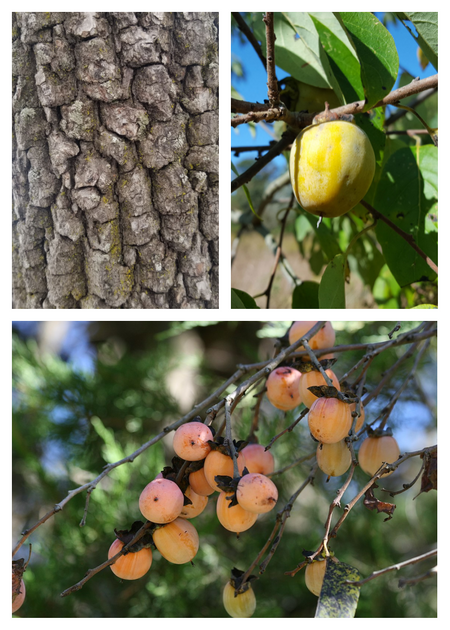American Persimmon

Scientific Name: Diospyros virginiana
Common Name: American or common persimmon; American date plum
Plant Family: Ebenaceae (Ebony family)
Etymology: Diospyros comes from the Greek words dios (divine) and pyros (wheat or grain), and together they translate to “divine fruit” or “fruit of the gods.” The word persimmon comes from putchamin, pasiminan, or pessamin, from Powhatan, an Algonquian language, meaning "a dry fruit."
Indigenous Uses
The fruits of Diospyros virginiana were used by the Cherokee, Comanche, Rappahannock, and Seminole for food and beverages. The fruits were dried like prunes for storage.
Traditional medicinal uses ranged from treating sore throats and mouths, to indigestion, thrush, and bloody bowels. Persimmon served as an astringent for venereal disease and a wash for piles. The bark was chewed for heartburn. A bark infusion of persimmon, alder, white walnut, and wild cherry was used for toothache. Cold water poured over the bark supported bile production and served as a tea for liver health.
Dense wood good for making billet or batons for flaking coarser grains or flints such as greenstone and quartzite.
Edible Parts
The persimmon fruit, which usually ripens in fall, is often used in jams and baked goods. The fruit pulp can be turned into molasses, and the seeds can be turned into a peanut-like oil or roasted and used as a coffee substitute. Dried leaves make a great tea high in vitamin C.

This project was made possible by a grant from Maryland Humanities, with funding received from the Maryland Historical Trust in the Maryland Department of Planning. Maryland Humanities’ Grants Program is also supported by the National Endowment for the Humanities and private funders. Any views, findings, conclusions, or recommendations expressed on this website do not necessarily represent those of Maryland Humanities, Maryland Historical Trust, Maryland Department of Planning, or National Endowment for the Humanities.

